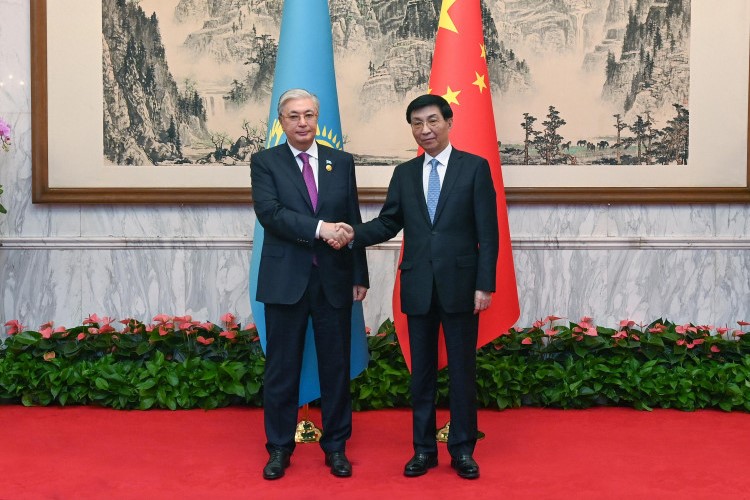
President Tokayev shakes hands with the Chairman of the National Committee of the Chinese People's Political Consultative Conference, Wang Huning. Source: Akorda.
At the Third Belt and Road Forum in Beijing, Central Asian presidents sought to mark the occasion by committing to deepen their countries’ relations with Beijing. The leaders of some of the republics, meeting with high-level Chinese politicians, sought to gain further investments from China, as Chinese and Central Asian leadership extolled prior cooperation and agreed to develop future relations between China and the republics. On Kazakhstan’s side, President Tokayev made a rhetorical promise to continue high-level political engagement with China (Akorda). The presidents of Uzbekistan and Turkmenistan signed bilateral agreements with China. Turkmenistan’s Berdimuhamedov signed an economic and technical assistance agreement with China, while his Uzbek counterpart deepened his country’s relationship with China by initiating a comprehensive strategic partnership with Beijing (Turkmenistan Today; UZDaily). Following the meeting, the director of the Eurasian Development Bank, headquartered in Almaty, Evgeniy Vinokurov, stated that the initiative is the “key” for Central Asian states to develop their economic potential and increase interconnectivity in the region (Sputnik). As such, following this meeting, it is expected that Sino-Central Asian cooperation will continue to develop rapidly.
Inaugurating the XI Kazakhstan Civil Forum this week, President Tokayev stated that the forum has acted as an important catalyst for the country’s civil society over the past decade. He stated that the forum enabled the work of charities, NGOs and volunteers to actively participate “in solving the most burning problems our society is facing” (Kazakhstan Today). In this year’s forum, the primary topic of discussion is how the country may better integrate the work of NGOs with the government to pursue the United Nations SDG goals (Kazakhstan Newsline). In addition, the president expressed his hope that the meeting could encourage “a cult of knowledge and labor” which reflects humanistic values and a respect for law and order in Kazakhstan (Kazinform).
Kazakhstan’s former Minister of Justice, Marat Beketaev was arrested this week on suspicion of corruption and bribery charges after an investigation by the state’s Anti-Corruption Service. The recommendation to arrest the Minister apparently came from President Tokayev after it was determined that Beketaev illegally lobbied on behalf of a foreign company to obtain preferential contracts from the Kazakh government. Beketaev had previously resigned from his position in 2022 after the January coup attempt (Tengri News). According to the Anti-Corruption Service’s Instagram page, officials are seeking the return of assets that were stolen by the Minister. Furthermore, officials state that under Kazakh penal law, no other details of the case can be revealed (Antikor).
This week saw a major push by Iranian diplomats to improve regional ties and cooperation with states in Central Asia. Iranian officials met in Samarkand, Uzbekistan with the country’s Minister of Ecology and Environmental Protection to pursue a visa-free travel regime between the two states. The Iranian Minister further sought the cooperation of Turkmenistan to create land corridors to facilitate travel and people-to-people exchanges between the three countries (The Tashkent Times). Concurrently, Iran’s new ambassador discussed increasing “mutually beneficial cooperation between Tashkent and Tehran (Uzbekistan MFA). In Tajikistan, Iran’s diplomat discussed facilitating Tajik-Iranian cooperation within “regional and international organizations” (Tajikistan MFA). Iran seems to be making diplomatic overtures to many of the countries in the region.
This week, a 6.3 magnitude earthquake struck the Afghan city of Herat, following a series of quakes last week, which left thousands of Afghanis wounded and hundreds dead (The Kabul Times). Following a call by the United Nations Office for Coordination of Humanitarian Assistance asking for $93.6 million to support the over 100,000 people affected by the quakes, many local and regional actors offered significant material and food aid to Afghanistan (The Kabul Times). The World Food Programme has so far been able to provide $19 million to those affected. However, a large grassroots movement to support the victims of the earthquake has risen. Across Herat, fifteen kitchens opened up to provide food aid to 5,000 people affected by the earthquakes (Khaama). States near and far have also sought to provide aid to Afghanistan. Kazakhstan has provided 1,662 tons of food aid and goods to the affected province, conveyed by railcar to support the people of Herat (Kazinform). China has further provided $4.5 million in aid to Herat following the disaster (ATN News).

